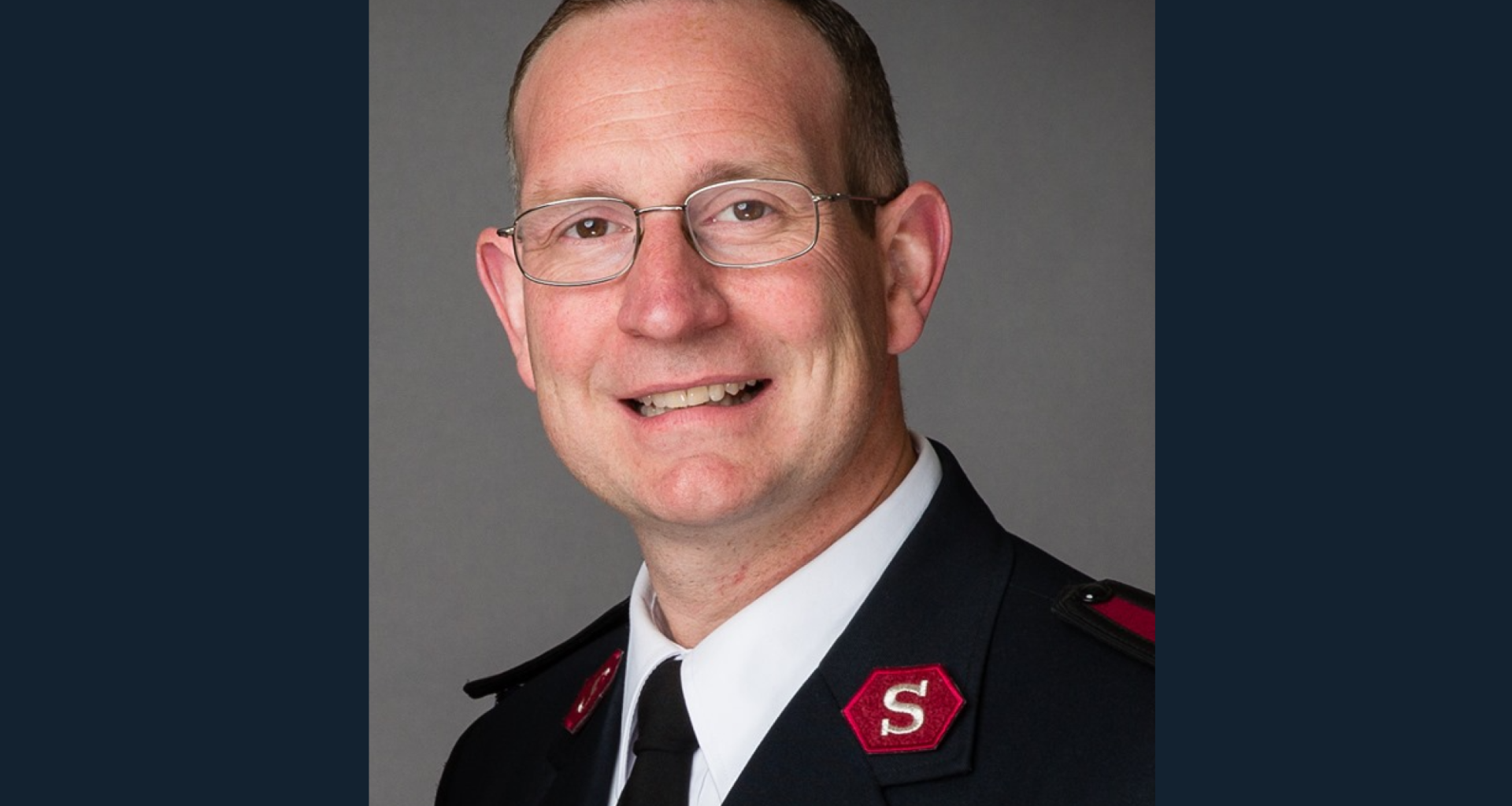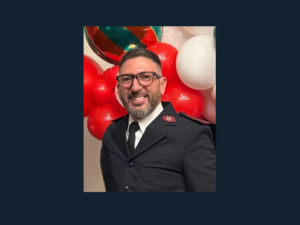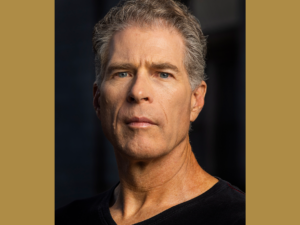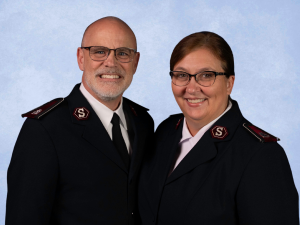Today, we’re heading to Long Beach, California, to talk to someone with a unique perspective on youth programming. Captain Jared Arnold runs The Salvation Army Red Shield Community Center, and he recently caught my attention when he said, “Summer is our Christmas.”
Now, when most of us think about summer, we might think about vacations, beach days or maybe just trying to keep the kids entertained. But for Captain Arnold and his team, summer represents something much more profound.
While school is out and many families are scrambling to figure out childcare, the Long Beach Red Shield becomes a hub of activity serving kids from kindergarten through eighth grade. Their summer day camp runs from June through August, providing not just a safe place for children, but a launching pad for growth, learning and character development.
But this isn’t just about keeping kids busy. The Red Shield operates year-round programming that includes everything from homework assistance and technology labs to 3D printing classes and partnerships with the LA Rams for flag football. They’re serving multiple generations—from young children to seniors—creating what Captain Arnold calls a truly intergenerational community space.
Serving communities that include Long Beach, Lakewood, Signal Hill, Hawaiian Gardens and Avalon, they’ve made their programs intentionally accessible to diverse neighborhoods with varying needs. So I wanted to understand: How do you create programming that truly serves everyone? What does it mean when summer becomes your Christmas? And what happens in the daily life of a community center that’s touching multiple generations?
Today, we’re getting an inside look at the energy, the programs and the victories—from puzzles to pickleball, from senior programming to youth development, and how one community center is working to ensure that every person who walks through the doors knows they matter.
Show highlights include:
- What a day at the Long Beach Red Shield Community Center is like.
- What Captain Arnold means by “summer is our Christmas.”
- What a day includes at summer day camp.
- More about the year-round programming.
- What they see in youth development.
- How Captain Arnold thinks about balancing the spiritual mission of The Salvation Army with meeting the practical needs of the community.
- The vision for the Red Shield’s future in Long Beach.
- The best way to support the work.
- What is giving Captain Arnold hope lately.
Listen and subscribe to the Do Gooders Podcast now. Below is a transcript of the episode, edited for readability. For more information on the people and ideas in the episode, see the links at the bottom of this post.
* * *
Christin Thieme: Can you paint a picture of what the Long Beach Red Shield Community Center is and who walks through your doors each day?
Captain Jared Arnold: Oh, wonderful. Yeah, so the Long Beach Red Shield is a membership-driven community center. So we are open to the whole community as far as our programs and our different events. We are membership in the sense that we have those who are paid-for members who participate in our weekly programming, everything from youth, all the way up to…We do have a member who’s 101 years old.
Christin Thieme: Wow.
Captain Jared Arnold: And so we have a senior club, we call our Silver Club, as well as just regular programs from athletics to arts, music, education, technology, just a whole gamut of different things that we offer.
Christin Thieme: And I’ve heard that you say, “Summer is our Christmas.” What do you mean by that and what makes summer so special at the Red Shield?
Captain Jared Arnold: Yeah. Summer is our Christmas in the sense that in The Salvation Army, many people see The Salvation Army in greater capacity during the Christmas season because we’re out in greater force into the community, ringing bells and raising funds, doing distribution of toys and other services during that season of need. So when I say that for us, the Long Beach Red Shield that summer is our Christmas, I mean two things. One that we ramp up our activities significantly. We institute additional programs, extended programs. We also have a lot more independent events, concerts and camps, sporting days. So we are ramping up our time, but in addition, we’re also ramping up our outreach. Schools are out for the summer, so we are extending what we do out to the community in a greater capacity for young people. And as things get hotter, we try to get out there more in the community to provide some additional services through cooling stations, through welcome stations, as well, just doing more visitation.
It’s a time when a lot of people, it seems a lull for some people in the summer. You have kids out and you have work. And so there’s not always an opportunity to get to a location. So we try to get out to other locations through partnerships and through other events.
Christin Thieme: I know as a mom myself of young kids, that summer can be challenging for parents because they are out of school. And so your summer day camp really serves a big need, I’m sure for many people. What does a typical day look like for these kids and how do you balance learning but with fun and the development that comes along with a camp experience?
Captain Jared Arnold: Oh, happily, and thank you for identifying something that was the impetus of why we decided to do such a long summer camp. Our summer day camp actually extends through the totality of the summer. It’s about eight weeks in total, from away camps to our independent day camps. And we did this because we had a recognition that day camp is a need in our community. We have a lot of single-parent households. Even those parents who are two-parent households, most of our families are two working incomes in the house. And so both parents are away at work and without school having that availability to be there for their kids during the day. They’re really left with only two opportunities. One, that they have to take time off of work, which can be detrimental to the family income, or the kids are just going to sit at home all day and we’re going to let video games be their guide throughout the whole summer season.
Now, some kids would probably love that. That’d probably be their ideal summer for the most part, but we want to make sure that there’s always an opportunity for that continued connection and community for our young people. We saw the impact with COVID when kids spent more time in front of a screen and less time engaging with each other. And so we increased our summer day camp programs as far as timeline goes so that we can meet that need and throughout the day. We start at eight o’clock. We do have a breakfast for those kids who just need a little bit of morning nutrition. If parents are a little later getting off to work, kids then go and they start their time, purely engagement. The first half hour to 45 minutes is just board games and small activities that the kids do with their independent groups. That way, they are starting the process of the day to get to know their peers, who are going to be in their group.
From there, we start to go into our chapel service. We make it very plain and open to the community. The Salvation Army is a church, and we do have a time where the kids gather together and we share with them stories from God’s word and we share with them lessons that are beneficial for everybody. And then from there, they break up into their groups. They do their singing their songs, and they break up and they go into rotations. And so the rotations differ based on the ages. We understand that older kids have a different need of learning than younger kids, and it’s not just learning like school. We make everything a hands-on experience. We do everything from enrichment where we’ll have music programming or art programming, all the way to always an opportunity for some sort of physical activity that we can really just make sure that the kids are getting that extra stimulation in their physical body so that they can really just have that summer experience.
It’s just they want to be a classroom. We don’t want to go from a school to a school, and we believe strongly that every child should have the opportunity to participate. So we’re always trying to adapt our programs for those who may have some sort of physical need or learning disability that we can better encompass and support.
Christin Thieme: I don’t know. I think I might have to come sign up for summer camp. It sounds pretty fun.
Captain Jared Arnold: You should. And if you can’t bring your kids, you can always come volunteer. We have a lot of volunteers who work with us during our summer day camp. Last year, actually, we had to cap our summer day camp at around 75 kids. And I say cap in the sense that we said 75. It would often run into the 80s and sometimes the lower 90s. And so this year, we’ve put kind of an estimation around 100 kids and 100 kids requires a lot of supervision, a lot of support, and a lot of people coming alongside to make sure that they’re having a great summer and great memories are being made.
So while we have our own staff, we also have some partnerships within the community. We have a program called Grandparents as Parents, which is a program, a separate non-profit organization who works with grandparents who may be raising their grandchildren. And that program works with us during the summertime to not only have their grandchildren come and participate, but then those grandparents to volunteer as well so that they can support and be with their grandkids and support in the greater mission of The Salvation Army with these kids for the summer.
Christin Thieme: That’s really cool. What a gift to these families. And then beyond summer, it doesn’t end there, right?
Captain Jared Arnold: No.
Christin Thieme: You have the Red Shield Youth Club that runs year round. Can you tell us more about how this programming, this effort extends beyond the summer?
Captain Jared Arnold: Yeah, very good. And I would say that summer really is a ramp-up season for us for our youth club. Our youth club is ages kindergarten up to eighth grade, though it is our goal this year to institute a high school program or a high school track specifically within youth club, but youth club is not an after-school program. I always have to emphasize that because an after-school program usually denotes that the kids are coming in and it’s homework help, it’s tutoring. While we do have elements of that with inside of our youth club, the real goal of youth club is a holistic enrichment environment. And I know those are some wonderful buzzwords to use for donor relations purposes, but they are true in exactly what they are talking about, that we are instituting programs specifically in youth club that engage the kids both intellectually, but also for some of those life skills that sometimes get lost in the way.
Things like, in all truthfulness, just basic dietary habits. We do a family-style meal so that kids learn to please and thank yous, that they are passing food around, that they are cleaning up after themselves in addition to just receiving something. We have music programs as part of our youth club. We have many different athletic programs from basketball to karate. Even field hockey has become very popular up on our field, our soccer field, almost competing a little bit with our soccer clubs. And then we have some more alternative sports that are becoming very popular, pickleball, which has become hugely big, that we do a lot with our silver club, but our youth like to play it too. Our intergenerational matches are always fun to watch.
Christin Thieme: That’s fun.
Captain Jared Arnold: A 75-year-old grandmother versus her 14-year-old grandson. It’s always just a great time to watch the grandson lose mercilessly to their grandmother. They say they do it because it’s their grandma and they don’t want them to feel bad, but we all know the truth of it.
Christin Thieme: Yeah. Yeah.
Captain Jared Arnold: She’s had a little bit more practice. So youth club is really to engage in all aspects, and it is after school because that’s when the kids are available. We do reading. We have a lot of guest speakers from the community. We recently just did a book signing event with a local author. We’ve had firefighters come in and just share a little bit about what to do in emergency. We’ve even had local restaurateurs come in and just talk about proper nutrition and what to look for when you’re in a restaurant. So the goal is to not just educate, but to help in the growth of these young adults.
Christin Thieme: What have you seen in these daily touch points when you’re interacting with these kids day after day? What have you seen in terms of the growth, in terms of how they are developing? What’s the impact in your mind?
Captain Jared Arnold: Yeah. I would say that we have the benefit of getting to engage these young people on a daily basis. We’ve just concluded our fourth year at the Long Beach Red Shield and some of these members of ours have been here since the first day that we arrive, in the summer program that we had initially ventured upon, and to watch them grow from kids into what really is becoming young adults. Matter of fact, we’re having our second graduation within youth club. Not graduating high school, but the kids graduating from youth club into that older kid, that teen era. And to see just the growth and confidence from many of them.
When we arrived, we were still inside COVID and the Long Beach Red Shield, prior to us coming here, and so I want to give gratitude to our predecessors for instituting this, they did a remote schooling here at the Red Shield. So parents who had children who couldn’t go to school, but the parents were also nurses or they were key needed individuals during the COVID time, their kids came here and they maintained with us. And we just got to see a whole different dynamic from just a young person who was just unsure of themselves, frustrated with the environment, to really kind of becoming and growing into their own.
There’s one young man, can I use a name on here? Should I be ambiguous? I don’t know. He may listen to it because I’m going to be spreading this pretty heavy after we’re done here.
Christin Thieme: That’s right.
Captain Jared Arnold: Well, we’ll just call him Carter—
Christin Thieme: Okay.
Captain Jared Arnold: Because that’s his name. So Carter’s a young man who started with us during that summer program and he was just always such a lack of confidence. He never really wanted to try anything because he was always afraid that it wouldn’t go out well for them, that it wouldn’t be successful for him, that he would fail at it. And so it was really just anything we could do to get him to participate. But little by little, we have seen over these four years, he has participated in our Rams flag football. It’s our flag football program sponsored by the LA Rams. And the first year, he didn’t even really want to get in the field. By the second year, you could not get that kid off the field. It’s like, “Carter, give somebody else a chance.” He’s like, “I got to run one more. I got to run one more.”
And he has participated in almost every one of our enrichment programs and each time he comes out of one, you do see more and more confidence. He’s now firmly embedded with our teen programming. He participates in everything. This will be his first year going to teen camp. This year is going to be his first year going to WYI. So all these larger programs that The Salvation Army offers for teens, we are trying to leverage our community programs just to introduce them to a greater capacity of growth and opportunity that’s provided for them.
And we know that Carter is going to continue on with us and we’re just happy to be a part of the story of his life. We’re happy that in years, he’ll look back at The Salvation Army and say, “Hey, I used to go there. They gave me my first opportunity to throw a football. They gave me my first opportunity to participate in Adopt a Highway. They gave me my first opportunity to hand out a food box through their pantry,” and that’s going to make a lasting impression on him, which we are just so privileged to be a part of.
Christin Thieme: Yeah, it’s really cool. Carter, if you’re listening, you’ll have to come back and talk to us in a few years and tell us what that impact is like.
Captain Jared Arnold: Oh, my goodness. He’ll talk to you right now. However, you have to dedicate more than 20 minutes. He’s a very excited kid at this point.
Christin Thieme: I love it. We’d love to talk to him. You touched on this a little bit with the summertime chapel, but as a Salvation Army officer or a pastor, how do you think about and balance the spiritual mission of The Salvation Army with meeting the practical needs that you are meeting in the community?
Captain Jared Arnold: That’s a great question. I’ll answer it this way. I don’t think there’s a separation between the two. First and foremost, we’re firm believers that everything we do is about preaching the gospel of Jesus Christ and meeting human need in his name, that they are not two separate entities, that they are linked together. And when you look at it from that perspective, everything we do is about sharing the love of Christ with those in our community. We are very open with our community as to who The Salvation Army is. We are first and foremost a church. We are there in the community to support anybody without discrimination, and that’s the key emphasis, without discrimination. So in programs like our summer day camp, we let people know. We let the parents know. We let everybody know, “There will be a time where your children are going to hear about Jesus.”
And while some people may say that might detract from actually bringing people in, we’ve had more parents come to us and say, “I know that if this is your belief and you truly believe in these things, that our children are going to be safe with you. And we’d rather have them hear positive notes about Christianity than all the negativity that comes from things that are online or on the movies. We’d rather have them in a space of positive encouragement.” So on that perspective, we don’t shy away from who we are, and we also don’t allow our faith to limit who and how we help. Matter of fact, it’s because of our faith that we are motivated to do more for those in need, and we try to adapt this in every aspect of our programming.
Inside of our catalog, which everyone can check out at longbeach.salvationarmy.org, you can see our summer catalog. We clearly identify programs that are specific to our faith. We put a little cross on there with a little identifier that says, “This is not just a faith-based, but a faith-driven program or activity, and all are welcome to participate. All are welcome to come and enjoy that program together.” And then when we have an event that’s faith-centric, we openly promote it and we’ve seen nothing but positive response from our community. We have not had one person backlash on us and say like, “Hey, I came in here and you told me I was going to play basketball, and then all of a sudden, I’m getting scripture read at me.” No, we tell people, “This is going to be faith night on basketball, and there’s going to be Scripture read at the end of the game. So just prepare yourself for that.”
And so every aspect that we do, we do for the emphasis of really sharing the gospel, and we make that our prime directive for our programming. So if you come to the Long Beach Red Shield, nobody is going to turn you away. Everybody is going to engage you with love. And at the end of the day, we want to invite you to know more about our Jesus Christ. If you determine now is not the right time for that, that’s no problem whatsoever. We are happy to have still served you in his name, but it is in his name while we are serving.
Christin Thieme: Yeah, absolutely. What is your vision for the Red Shield’s future in Long Beach? You mentioned expanding into teen programming. What’s your dream?
Captain Jared Arnold: Ooh. Dream is dangerous because we have big dreams here, and I wouldn’t say it’s just mine. We have been blessed to have such a team who is so dedicated to the mission of The Salvation Army in Long Beach, that everybody is driving for the same intention of just growth and outreach. At the physical on the campus itself, we want to expand to more opportunities. We want to open up more avenues to engage people. And so what does that look like? It’s going to be different every season. We do our programs quarterly, specifically for the intent that we want to be able to rotate new things in. Back in the ’90s, we would’ve been POG Central.
Christin Thieme: That’s right.
Captain Jared Arnold: Pogs are long dead now. Who knows? They may make a resurgence.
Christin Thieme: Oh, man, I haven’t thought about Pogs in so long.
Captain Jared Arnold: I am holding onto mine, not only for nostalgia. I’m waiting for it to come back again.
Christin Thieme: That’s right.
Captain Jared Arnold: And I will double down on that with my—
Christin Thieme: I still don’t understand how those became a thing, but that’s another podcast.
Captain Jared Arnold: Oh, man. All the money I wasted on that.
Christin Thieme: Yeah.
Captain Jared Arnold: But the point is that whatever is now reaching people, we want to be that center where we can engage those people, and we don’t want to do it alone. We want to do it through partnership communities. And I think that’s really the dream we have is a greater extent of partnerships within the community. We want more professionals in their field. Regardless if it’s athletics, if it’s in music, if it’s arts, if it’s dance, we want more professionals to see us as a place where they can do their craft and encourage it to the rest of the community. And we can be a central location of safety. We can be a central location of enrichment and really be that place where people say, “I can do this. I don’t have a place to do it. The Salvation Army may be the place where I can do that, and then I can share within the community and more community can come in and participate.”
Christin Thieme: I love it. So for anybody who is listening who would want to support what you’re doing, either as one of those professionals or in some other way, what is the best way that somebody could get involved and support the work that you’re doing?
Captain Jared Arnold: One thing that anybody can do, if you have a gift or a talent that you want to share with the community, I’d invite you to come and talk with us. A lot of our programs that we’ve started to incorporate have purely come from individuals who have said, “I enjoy this. I think other people would enjoy this too.” A good example of that, our Silver Club. Our Silver Club is for ages 55 and older, and they have a presentation a week and the amount of people who have come forward to say like, “Hey, you have many people ages 55 and older. I enjoy crafts. Can I come and do a craft?” Of course, you can. We’ve had a few doctors who come and just really encourage health and fitness for those who are age 55 and older. So if you have that talent and you want to come share it, come speak with us, and let’s figure out how we can make those relationships work together.
Another great opportunity is volunteering. We still need volunteers. The Salvation Army still needs volunteers. We need people who are willing to give up their time, purely for the work of The Salvation Army in their community. And while we are blessed with having a greater extent of opportunities, every Salvation Army that’s out there can benefit from volunteers. So I would encourage everyone, find your local Salvation Army, contact them and see how you can get connected in with them to just give back into the work that’s being done.
And then, of course, just got to be very open and honest with it. The way our system works within this world today is that it takes money in order to keep the lights on. It takes money in order to keep things rolling along. So every penny that we receive, we receive in great gratitude because we know it’s going to further the mission. And so if you want to make a donation, I could always encourage to go check out any Salvation Army website, but if we’re talking Red Shield specific, longbeach.salvationarmy.org.
Christin Thieme: That’s right.
Captain Jared Arnold: There’s a donation button there. There’s also a button to look for volunteer opportunities, but I think just becoming part of the mission is how it’s going to better us and better the individual. We don’t look at our donors. We don’t look at our volunteers as outside entities. We look at them as stakeholders within the change that we are trying to make within this community, and we want them to come along and we want them to receive those dividends in the form of change, the form of change within the community itself.
Christin Thieme: I love it. As a last question for you, Captain Arnold, we have been talking a lot on this podcast lately about hope and choosing hope as a practice, not just as something that lands upon you necessarily. So what is giving you hope lately?
Captain Jared Arnold: I think what’s given me hope lately is to see the change in people. To see where people have been and to see where they are now, and it doesn’t always come in big swaths. It’s not like Carter who one day just barely picked up a football and now that’s his dream in life is to play. To go to college, to have a goal in mind. Sometimes it’s just talking to a person who every day just seems sad, and then one day you see them smile. Hope for me is that we have found a place where people can find hope for themselves, and that brings me more hope. It probably brings me more joy as well, but hope is knowing that there can be a difference and that it happens when we center ourselves on Christ and we are doing his work and we are creating that environment for others to know of his love also.
Additional resources:
- If you are one of the hopefuls, get on the list for the Do Good Digest, our free 3-minute weekly email newsletter used by more than 20,000 hopefuls like you for a quick pick-me-up in a busy day.
- If you are enjoying this show and want to support it, leave a rating and review wherever you listen to help new listeners hit play for the first time with more confidence.
- If you want to help The Salvation Army serve more than 27 million Americans in need each year, give today. Your gift of money, goods or time helps The Salvation Army do good all year in your community.
Listen and subscribe to the Do Gooders Podcast now.












